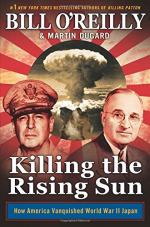|
This section contains 749 words (approx. 2 pages at 400 words per page) |

|
Were the Allies right to insist on Japan’s unconditional surrender?
Even those who believe Japan was in the wrong and needed to be defeated in World War II may question the "unconditional" aspect of the demand. By insisting that Japan accept all of its terms this decision eliminated the need for negotiations, but also may have backed the Japanese into a corner, especially their leaders, who worried of war crimes prosecution.
Were members of the winning side, such as those that authorized the conventional bombings of Japan, guilty of war crimes?
General Curtis LeMay, who ordered the fire bombings of Japan, expected to be prosecuted for war crimes if the U.S. lost the war. Are certain actions war crimes regardless of whether the victor or the loser carry them out? If so, would the A-bombs on Hiroshima and Nagasaki count?
Why do you think most of this book is told in present tense?
|
This section contains 749 words (approx. 2 pages at 400 words per page) |

|



